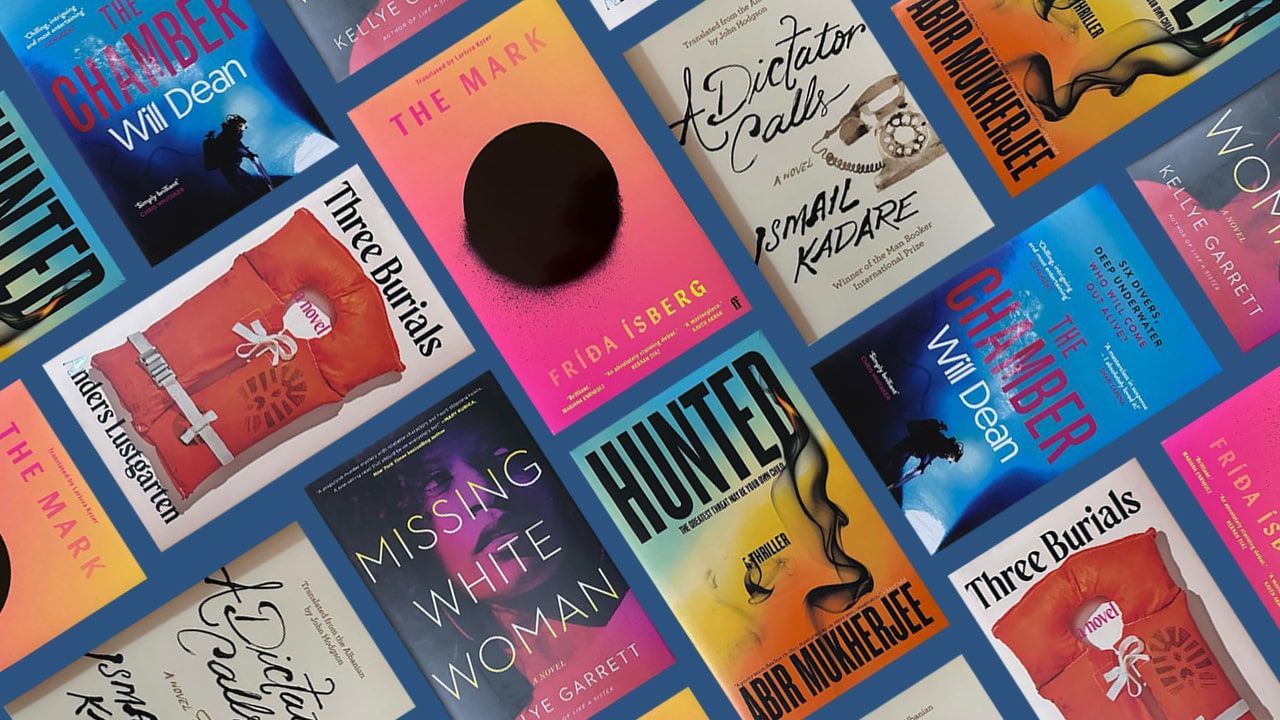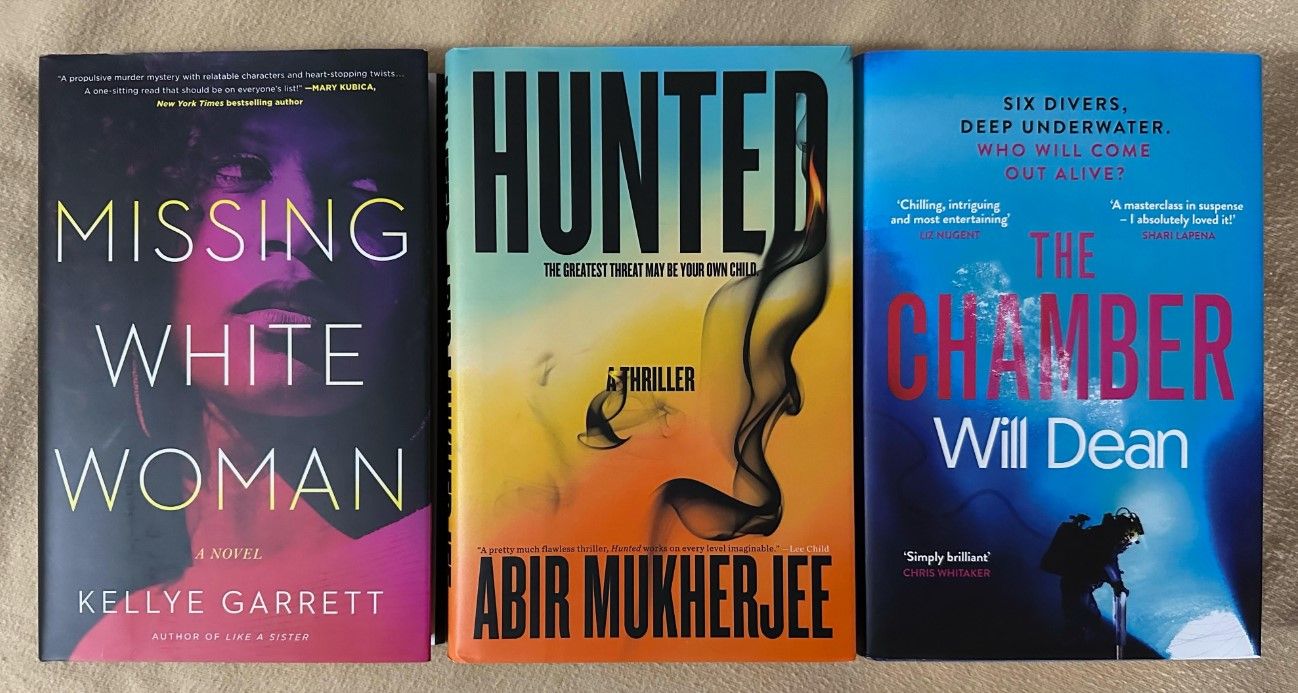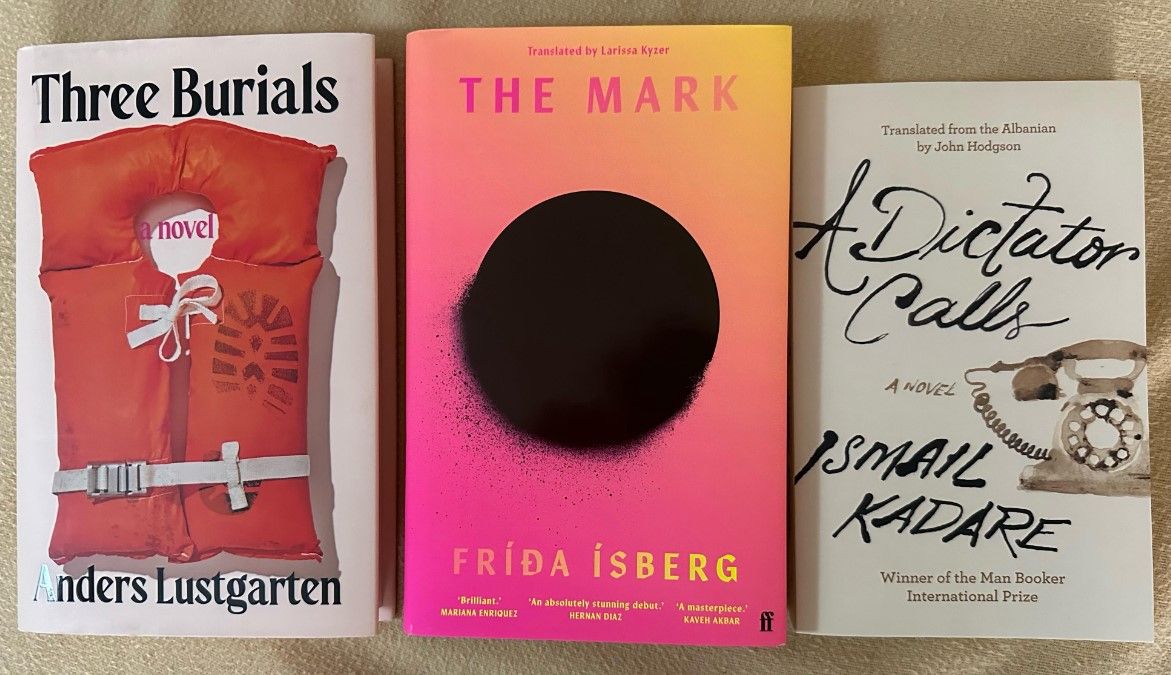IYCRMM: Contemporary suspense, plus tales of the past and near-future
Book reviews on "Missing White Woman," "Hunted," "The Chamber," "Three Burials," "The Mark, and "A Dictator Calls"

How to define "things that go bump in the night" in today’s world, is taken up by some of the novels assembled here. Then there’s literary fiction of a high order.
Missing White Woman by Kellye Garrett
Like it’s been stripped from the headlines of your favorite news portal, here’s a thriller mystery that examines the plight of African-Americans through the lens of US law enforcement. Breeana and her new boyfriend, Ty, rent an upscale Airbnb in Jersey City. Ty works for JP Morgan in Manhattan, and this is his chance to show off Manhattan to Bree. The apartment is located in a predominantly white neighborhood, and the big buzz when they arrive is the disappearance of a pretty white woman, Janelle Beckett. Janelle, who used to walk dogs in the vicinity, has vanished without a trace, sparking intense speculation on social media.
Bree and Ty's relationship has been turbulent, with Ty often preoccupied with work. The plot thickens when Bree wakes up one morning to find Ty already gone and discovers the bloodied, dead body of a woman in their living room. Panicking, she runs out to rouse the neighbors and call 911. When the corpse is identified as Janelle, suspicions quickly turn to Ty, especially when it’s revealed that they were once friends and dated in college. With Ty missing, Bree turns to her old friend, Adore, a lawyer, to help her navigate the mounting suspicions and damning allegations. The story delves into the powerful role of social media and bloggers in modern investigations and the public's obsession with true crime. In this compelling mystery, no one is who they seem at first.

Hunted by Abir Mukherjee
With the US Presidential elections a scant few weeks away, a terrorist bomb detonates in a LA mall; and subsequent to that, an Asian-American FBI agent, Shreya Mistry, risks life and limb to get to the surveillance tapes. She discovers that a Muslim girl who flew into Portland from London may have been responsible for the bomb. Further investigating shows that this girl was accompanied by another London Muslim girl, and the search is on for Aliyah Khan. Back in Heathrow, the father of Aliyah, Sajid, is brought in for questioning, and when released, he gets an unexpected visit from a woman, Carrie, who claims she’s the mother of an American vet who wrote her a letter talking about Aliyah. Suddenly, the novels adds to the dimension of Shreya investigating, the new narrative strand of two parents trying to save their children.
Welcome to this dense, new suspense novel of Mukherjee. It’s a narrative that knows how to keep you on the edge of your seat, and transfer attention from the female agent to Aliyah’s father, and on to Carrie’s son, Greg, without missing a beat. The mystery behind Miriam, a senior woman who heads the terrorist cell in Oregon, is a compelling one. She fascinates, and Mukherjee purposely withholds us knowing much about her, adding to the tension. At some point, as we would expect, the narratives of the three intersect and bring the novel closer to it’s chilling resolution. The two Presidential contenders and their respective last rallies become the setting for how the story will end. And it’s here where I felt there was something of a stumble - the getting to this point so much better than how the story concludes.
The Chamber by Will Dean
Talk crime fiction genre and the locked room mystery will come up; so you’ll end up saluting Will Dean for conjuring up a truly original take on the concept of the locked room. Our protagonist, Ellen Brooke, is a saturation diver in the North Sea oil rigs off Scotland. Along with five other divers they enter a hyperbaric chamber, breathing a mixture of helium and oxygen for a full month. This allows them to work in pairs descending via a diving bell to work on and repair oil pipes. We’re introduced to the five other divers, Mike, André, Tea-Bag, Spock, and Jumbo, each very distinct characters. The job pays very well as it’s highly dangerous, and only a select few prove themselves capable of doing this on a regular basis. It’s a crazy confined space for six persons, and beyond the physical toil, there’s also the mental fortitude required.
The plot proverbially thickens when Tea-Bag is found unresponsive, and has expired. Placed in a body bag, there are four days of decompression that has to happen before the hatch can be opened. And when a second diver mysteriously dies the next day, the prevailing thought is that while one could be an accident, two is obviously a sign that a crime has been committed. The four surviving members now have to galvanize to ensure that four divers exit from the chamber, while placing the corpses in the wet pot (a small space attached to the chamber). Tensions between the four rise as one isn’t sure if the deaths are being caused by the people outside the chamber, or by one of the four. It high wire suspense, and a lot of back stories about saturation diving and it’s history. Compelling stuff.

Three Burials by Anders Lustgarten
This is the debut novel from Lustgarten who is popularly known as a playwright. His "A Day At the Racists" has won major prizes, and reflects how his works often take on subjects relating to social injustice. In the case of this book, it’s about the refugee situation, police violence, and the quest of one of his main characters, senior ward head nurse Cherry, to come to terms with the suicide of her favorite child, and find new purpose in life. In the process, Lustgarten holds a mirror up to contemporary society in Britain, showing us the ugly and reprehensible, along with the noble and exemplary. What makes the read so compelling is how it’s written as a black comedy, while still tackling very serious matters and circumstances. This novel is begging for a film treatment.
The story opens on a flimsy refugee vessel off the coast of England, and how the seven Africans on board are met by a police patrol boat. Junior patrolman Andy Jakubiak, of Polish descent, is filming on his phone how racist DI Freddie Barratt, attacks Omar, one of the refugees. Barratt succeeds in killing him through violence before Omar floats away and eventually, washes up on the shore. What follows is a crazy car chase that involves Cherry, a Jakubiak handcuffed to the corpse of Omar, and Barratt in hot pursuit. How that strange set of circumstances came to be, and what subsequently transpired make up the plotline of this hugely entertaining novel. It’s a woman with a conscience, pursued by a racist officer of the law, and the refugee crisis placed in a nutshell. Come for the ride, and stay for the wisdom.
The Mark by Frida Isberg
A polyphonic novel, this Award winner from Iceland heralds a new writer who masterfully mixes suspense with social commentary. The voices of this novel are diverse; there is schoolteacher Vetur, callous businesswoman Eyja, the influential psychologist Òlafur, and the stubborn, alienated student Tristan. At the core of the narrative is a sensitivity assessment that the Icelandic Psychological Association would like administered to everybody. It’s essentially an empathy test that measures antisocial behavior potential - "marking" individuals who don’t pass, even if they have not committed any crime. It’s the ethical and societal implications that are being put to the test in a referendum that will decide if the assessment be compulsory.
Via a round robin of chapters, each of the four voices offer us differing perspectives on the reaction to this test and the impending referendum. Tristan fights for the right not to be tested, while Eyja has already failed the test, and we see how it has affected her and the people who she interacts with. Ólafur receives death threats as the professional face of the assessment - and some of threats come from Tristan - an opportunity for two of the narrative strands to intersect. Vetur has her own set of issues, mostly dealing with an unmarked ex-boyfriend who’s stalking her, after an isolated incident. Set in a near future that could just as well represent today, the novel deftly touches on issues on the rights of society vis-a-vis that of the individual; and squarely asks us to consider the costs versus the benefits. We all have to make our own decision.
A Dictator Calls by Ismail Kadare
A slight novel, this work from Kadare (who just passed away at 88, on July 1, 2024) is both a creative flight of fancy, and a serious meditation on the nexus between politics and Art. The premise stems from a historical phone conversation that dates back to 1934. Taking all of three minutes, it was Josef Stalin calling writer Boris Pasternak, to ask what Pasternak thought about the arrest of fellow writer Osip Mandelstam. There has been much speculation about said conversation, what was or wasn’t said; and all made more momentous by the fact that while Mandelstam was released, he’d be brought back time and again, dying in exile in 1938. Similarly, it scarred Pasternak’s reputation, blemishing his Nobel Prize for Literature award in 1958. It’s an incident in Russian history that has turned into urban legend.
Beyond the call itself, the afterlife of that call is thoroughly explored by Kadare. It’s Literature and authoritarianism colliding - the cult of the tyrant challenging the cult of the writer and poet. There are no less than 13 versions of the call and what transpired offered by Kadare, complete with sources. And it’s a telling exposition of how the most minute of changes can radically affect the reportage, the outcome, and the fallout to the three parties involved: Pasternak, Stalin, and Mandelstam. Decades later, Enver Hokha (the political equivalent of Stalin in communist Albania) calls Kadare on the phone, and Kadare can only mumble his thanks - hence, drawing parallels with what Pasternak encountered, and Kadare reflects on his own life. It’s this kind of intellectual honesty that keeps us turning the pages, even if the subject matter has seemingly been exhausted.